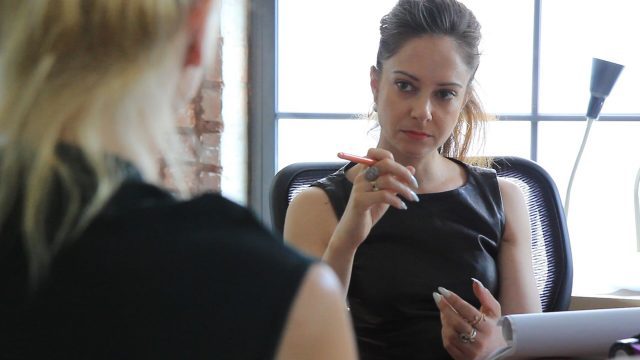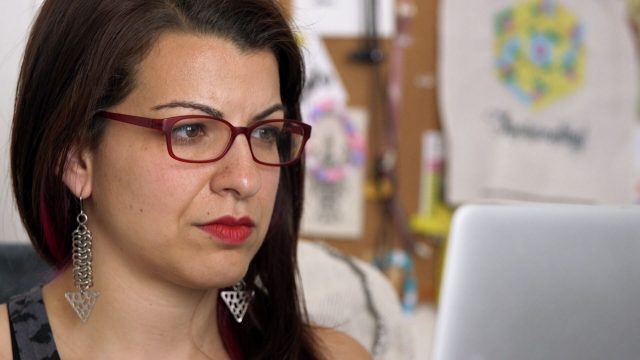
Lawyer Carrie Goldberg fights cyber harassment and digital abuse in Netizens
NETIZENS (Cynthia Lowen, 2018)
Tuesday, April 24, Regal Cinemas Battery Park 11-6, 5:15
Friday, April 27, Cinépolis Chelsea 4, free with advance ticket, 7:30
www.tribecafilm.com
www.netizensfilm.com
 In its April 24 newspaper, the New York Daily News reported a story about former Queens high school principal Annie Seifullah, who was suspended for a year without pay after X-rated pictures of her were found on her school computer. Seifullah lost her job even though the photos were allegedly placed there by an ex-boyfriend as an act of revenge porn — something city investigators did not dispute. Seifullah, represented by attorney Carrie Goldberg, is now suing the city over gender discrimination. The situation could have come straight out of Cynthia Lowen’s new documentary, the gripping, eye-opening Netizens, which is having its world premiere at the Tribeca Film Festival, with upcoming screenings on April 24 and 27. The film follows the work of three women — including Goldberg — who are leading the fight against cyber harassment, revenge porn, and digital abuse. Lowen explores not only the invasion of privacy but the financial, professional, and psychological effects of these cyber attacks, which remain with the victim for a long time. “There’s not moving on beyond the trauma because the trauma is your shadow,” the Brooklyn-based Goldberg says. Goldberg, who also suffered cyber abuse at the hands of a man she dated for only four months, later adds, “The nonconsensual distribution of sexually graphic images and videos causes immediate, irreparable harm to its victims.” The virulent hatred with which environmental commodities trader Tina Reine has been attacked online by her ex is absolutely terrifying. The man has built myriad websites condemning her and continues to stalk her to prevent her from restarting her career. “I just want to move on and have a normal life,” Reine says. “And that’s not really expecting that much. So I will do whatever it takes to get this solved, but I’m tired.”
In its April 24 newspaper, the New York Daily News reported a story about former Queens high school principal Annie Seifullah, who was suspended for a year without pay after X-rated pictures of her were found on her school computer. Seifullah lost her job even though the photos were allegedly placed there by an ex-boyfriend as an act of revenge porn — something city investigators did not dispute. Seifullah, represented by attorney Carrie Goldberg, is now suing the city over gender discrimination. The situation could have come straight out of Cynthia Lowen’s new documentary, the gripping, eye-opening Netizens, which is having its world premiere at the Tribeca Film Festival, with upcoming screenings on April 24 and 27. The film follows the work of three women — including Goldberg — who are leading the fight against cyber harassment, revenge porn, and digital abuse. Lowen explores not only the invasion of privacy but the financial, professional, and psychological effects of these cyber attacks, which remain with the victim for a long time. “There’s not moving on beyond the trauma because the trauma is your shadow,” the Brooklyn-based Goldberg says. Goldberg, who also suffered cyber abuse at the hands of a man she dated for only four months, later adds, “The nonconsensual distribution of sexually graphic images and videos causes immediate, irreparable harm to its victims.” The virulent hatred with which environmental commodities trader Tina Reine has been attacked online by her ex is absolutely terrifying. The man has built myriad websites condemning her and continues to stalk her to prevent her from restarting her career. “I just want to move on and have a normal life,” Reine says. “And that’s not really expecting that much. So I will do whatever it takes to get this solved, but I’m tired.”

Anita Sarkeesian exposes online gender, race, and sexual discrimination in Tribeca Film Festival documentary
Even though the legal system can identify the responsible party, there are no clear legal channels for Reine to pursue. She was unable to get an order of protection, and her abuser uses the First Amendment to protect his legal right to continue the harassment. “It’s two different rules for men and women when it comes to sex,” Reine explains. Meanwhile, media critic Anita Sarkeesian has received death threats for decrying the depiction of women in video games, leading her to establish Feminist Frequency, which exposes gender, race, and sexual discrimination via The Freq Show and public appearances. “What do these platforms stand for and what do they want their platforms to be? Do they want it to be a cesspool of hate or do they want to actually make it something that users want to participate in and engage in?” Sarkeesian, who has also experienced cyber harassment, asks. “The thing about being attacked for four years is it takes away your humanity. You don’t get to feel to the extent of a human range of emotions because you can’t or else you’d be floored all the time. You have to be hypervigilant, and you can’t make jokes, and you can’t be human, and you can’t exist in the world like everyone else.”
In her directorial debut, Emmy-nominated writer and producer Lowen also speaks with Ordinary Women producer Elisabeth Aultman, University of Miami law professor Mary Anne Franks, Feminist Press executive director and publisher Jamia Wilson, Hate Crimes in Cyberspace author Danielle Keats Citron, Feminist Frequency managing editor Carolyn Petit, and Women’s Media Center Speech Project director Soraya Chemaly; the only man interviewed in the film is former assistant U.S. attorney and chief of cyber and intellectual crimes unit Wesley Hsu, who points out with regard to the cases, “The harm is immense. That’s why they’re worthy of prosecution.” Throughout the film, Lowen revisits the case of Celia, a young Mexican woman who doesn’t know who is stalking her. The resolution of her situation is frightening, representative of why it’s so difficult to arrest and imprison the perpetrators of these digital crimes. Perhaps Sarkeesian puts it best, however, placing cyber harassment in historical context: “It’s not like misogyny started when the internet started or when Twitter was developed.” It’s the monstrous amplification of misogyny that these platforms permit that takes one’s breath away — and all too often the victims’ lives as functioning human beings, on- and offline.